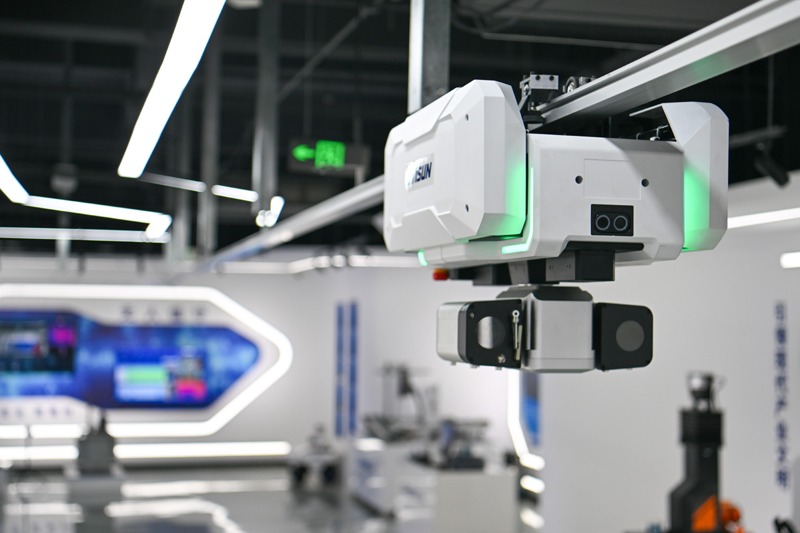Solutions to be searched as robotaxis gain in popularity
Safety and economic concerns highlighted as autonomous service hits the street


Robotaxis from Baidu's Apollo Go are sparking discussions in China, as they automatically navigate into more cities but sometimes fumble for the right move.
Footage on popular short video platforms shows a robotaxi in Wuhan, capital of Central China's Hubei province, stopping in front of an empty plastic bag on the road, causing a traffic jam.
In another video, they are seen facing each other, not knowing what to do next. In a more serious incident, a robotaxi was involved in a traffic accident after failing to "see" a pedestrian.
Apollo Go's Chinese name is Luobo Kuaipao, which literally means robots run fast. But their online infamy has won them a new nickname in Wuhan: dumb robots.
Zhang Xiang, an auto analyst at North China University of Technology, said it will take at least 10 years for large-scale business operations of robotaxis in the real sense.
But that is good there will be ample time for the sector and authorities to consider solutions to problems that are already causing concerns.
One problem is employment. Taxi drivers in Wuhan are complaining about a fall in the number of orders, as Baidu's robotaxis are wooing passengers away with heavy discounts. The drivers accuse them of unfair competition.
A receipt for a 28-kilometer, 64-minute trip in the city showed that the fare was just 26.52 yuan ($3.65 yuan). But a closer look reveals that it had a discount of 109.52 yuan applied.
This reminds people of the fight between Uber and Didi years ago in the Chinese market, which resulted in a lot of coupons being issued to passengers. However, that did not last and prices rebounded when Uber and other smaller rivals were wiped out.
If that would be the case for robotaxis, taxi drivers are posing a serious question that may entail the efforts of different sides to solve.
Wang Chuanfu, chairman of BYD, has been questioning the ambiguity about liabilities in traffic accidents that involve driverless vehicles.
His concern is understandable. One extreme scenario might be an accident that causes injury or death.
In such cases, it is not clear so far who will be held responsible, be it the software engineer, the vehicle's producer or the legal representative of the company that offers driverless rides.
Robotaxi companies also don't have a solution when an injured passenger or road user needs help.
Some analysts have urged the permanent presence of a human in the vehicle, be they a co-driver or a safety operator, who can respond to any urgent needs of the car or other road users, like in Beijing and Shanghai.
Shanghai will launch a public testing program for its driverless taxi services later this month. The city issued the first permits for demonstration applications of driverless vehicles to four companies on July 4.
Autonomous driving companies have since been preparing and fine-tuning their systems before initiating public testing, which will be free of charge to people.
"Currently, the vehicles can handle more than 90 percent of urban scenarios, making them even safer than novice human drivers," said Chen Guofa, quality and operations director at SAIC AI Lab Technology, one of the companies involved in the program.
"For the remaining scenarios, such as congestion or ambiguous traffic rules, we're developing improved game theory algorithms to ensure appropriate responses, rather than always yielding or remaining stationary in heavy traffic."
Chen said the initial public testing phase will involve five vehicles, with plans to gradually introduce more models and expand the fleet based on the performance of the driverless taxis during the trials.
"Our company is currently testing the third-generation products, with plans to deploy more than 40 vehicles by the end of the year," he said.
So far, more than 20 cities nationwide have introduced policies supporting autonomous driving tests, with more than 60 enterprises having obtained self-driving test licenses.
Zhang said ensuring the safety and stability of robotaxis remains a top priority. More efforts are required to enhance self-driving testing and application scenarios, optimize algorithms, reduce the manufacturing costs of driverless vehicle components, such as lidar sensor systems, and strengthen the construction of intelligent transportation infrastructure, Zhang added.
According to research company BloombergNEF's report, China will operate the world's largest robotaxi fleet of about 12 million self-driving vehicles by 2040, followed by the United States with around 7 million such vehicles.




































